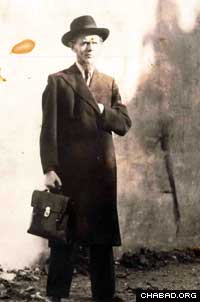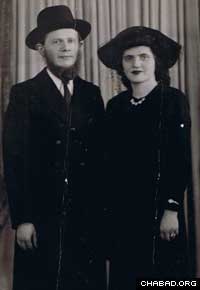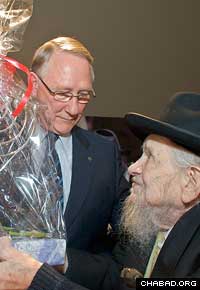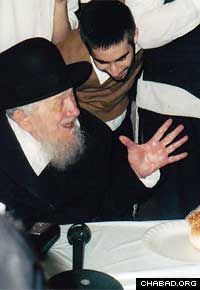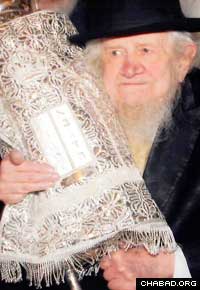Friday, January 28, 2011
shlomo maman
Thursday, January 27, 2011
Rabbi Levi Shemtov
I was about 15 when I arrived to learn in Montreal and R’ Volf gave us a shiur Chassidus every day in the Frierdike Rebbe’s maamorim. While I can’t claim to remember every word, of course, I still vividly remember the deep respect and awe he showed upon uttering each word and how he conveyed it. It was often “himmeldig” and you felt you were really learning from a true chossid who felt the sanctity of the maamer – a difficult thing to impart at our age then.
In truth, he was a very private person, and didn’t talk about himself much. But I got a keen insight into him because I very often stayed in his house so he wouldn’t be left at home alone after his wife a”h passed away. Basically, I spent my free time in the dormitory but went to his house to sleep. Every night, he would listen to the news on a little radio for a few minutes to know what was happening in the world. As any bochur who got that “look” from R’ Volf knows, he was more aware of things around him than he let on.
But most of the time I saw him he was learning, or as I witnessed many times, saying krias shma for long periods of time before he went to sleep. This made a great impression on me because most times he could never know I was watching. There were some times I think he did some things for my benefit, like learning from a Steinsaltz gemara, which I thought was to show me it wasn’t the worst thing in the world, should I need it. Or when he made sure there was some mezoines in case I wanted some in the morning. He was a real role model in many ways,
The MOST joyful thing for him was when his grandchildren came to visit. His face would light up and you could see the sheer naches and enjoyment he felt when they were there. He didn’t like when people spoke loshon horah. Sometimes he would cover his ears, other times he would merely change the topic. He understood a good joke in the appropriate time.
But above all, he was more than a chassidisher yid – chassidus was his very life. He was one of a kind, and he is surely sorely missed. I only hope that lemayla he is continuing to shturem in his unique way, to bring Moshiach du lemateh bepoyel mamesh.
Sunday, January 23, 2011
Menachem Shuchat
Saturday, January 22, 2011
Itche Meyer Lipszyc
Wednesday, January 19, 2011
Montreal Kabbalist and Educator Passes Away at Age of 94
Rabbi Menachem Zeev “Wolf” Greenglass, the Montreal Kabbalist, educator and community activist who touched thousands of students over the years, passed away last month at the age of 94. Known for his humility and low-key demeanor, Greenglass was remembered by Montrealers and graduates of the Rabbinical College of Canada—a Chabad-Lubavitchinstitution he helped establish after escaping war-torn Europe during the Holocaust—as a faithful spiritual leader who offered a mixture of wisdom, insight and profound understanding. Born in Lodz, Poland, in 1917, Greenglass grew up in the home of his parents, Avraham and Chava Greenglass, followers of the Alexander chassidic dynasty. At countless chassidic gatherings throughout his life, Greenglass affectionately recalled the love of Jewish learning that permeated his boyhood home, describing his father as a scholar who, despite his job as a property manager, carved out time to review the weekly Torah reading with him and to reveal some novel explanations while doing so. After his formal education in Lodz, the young Greenglass, who at the time was working in a factory, became close to Rabbi Zalman Schneersohn, a descendent of the first Chabad Rebbe, Rabbi Schneur Zalman of Liadi. Schneersohn organized classes and chassidic gatherings in his home, and Greenglass was captivated by the Chabad approach. Later in life, Greenglass disseminated the very same teachings and stories he had absorbed as a young student. When he was twenty years old, Greenglass travelled to Otwock and enrolled in the Lubavitch yeshivahthere. Attracted to the scholasticism and prayerful devotion that became a hallmark of the school, Greenglass earned a reputation as a bright student who, nevertheless, exhibited a streak of free-spiritedness. During a private audience with the sixth Chabad Rebbe, Rabbi Yosef Yitzchak Schneersohn, of righteous memory, the Jewish leader told Greenglass to think twice before saying anything, a directive that he strove to follow from that point on. In Otwock, Greenglass met the Sixth Rebbe’s illustrious son-in-law and future successor, the Rebbe, Rabbi Menachem M. Schneerson, of righteous memory. At the time, this son-in-law—who was known as the Ramash, from the acronym of his name—was appointed by the Sixth Rebbe as a spiritual mentor to the yeshivah students. According to Greenglass, the Sixth Rebbe said that his son-in-law “would be interested in the spiritual aspect of the students, and guide them in their spiritual matters.” Greenglass recalled the Ramash challenging the students during the chassidic gatherings he led, and in his many one-on-one conversations with them. But as he was without the necessary Polish documents, each of the leader’s trips to the country was short. More than “80 students would gather around for two hours,” Greenglass, who kept up a diligent correspondence with the future Rebbe after moving to North America, once detailed many years later. “The students would relish those gatherings.”
Otwock in FlamesGreenglass was soon appointed to be a mentor of a selected group of students at the school, but found his life in tumult as the early battles of World War II brought the Holocaust to his doorstep. In little time, Otwock—a vacation spot for many Jews from Warsaw—became a war zone, a target of the Germans’ early bombing campaigns. Following instructions from the Sixth Rebbe, Greenglass headed to Vilna in neighboring Lithuania, and enrolled in the Lubavitch yeshiva there. In Warsaw, each member of the group of three received 150 zlotys for travel expenses and to pay someone to smuggle them across the border. At a train station, the students were stopped by several Nazi soldiers, who took them to an upstairs room to be searched. The interrogators asked about their prayer boxes, known as tefillin, and then told them to wear them. They ordered the students to remove their clothes and began looking for hidden valuables. When the soldiers came across a volume of chassidic teachings that Greenglass had used to hide their money, an officer threw the book into the air. The money miraculously remained inside the volume the entire time. In Vilna, the new arrivals did what they could to put the war in the back of their minds, returning to their customary daily learning schedule. But they also carried out a directive of the Sixth Rebbe, writing to other students in Poland to implore them to immediately make their way to Lithuania. When the war caught up with them, Greenglass and his peers were among the thousands of people who received transit visas from the selfless Japanese consul, Chiune Sugihara. They made their way by rail through Russia, stopping at the eastern port city of Vladivostok. From there they travelled by boat to Japan, and on to Shanghai, China. Nine of them, including Greenglass, eventually received visas to Canada. Directives From New YorkClad in their old-world clothes, Greenglass and his friends found themselves thrust into the spotlight upon their arrival in Canada. With guidance from the Sixth Rebbe, who by that time was safely in New York, the students immediately immersed themselves in communal work. Exuding Jewish pride, they became known as dedicated teachers. They opened schools and worked with Jewish children enrolled in the local public school system. As the programs accelerated, the students kept the Ramash, who had also made his way to safety in New York, updated on their progress. During a visit to New York in 1944, Greenglass met with the Sixth Rebbe, who expressed delight that Greenglass was in touch with the future Rebbe about the Montreal activities. The Ramash, who directed the Lubavitch publishing house and its educational arm, constantly encouraged Greenglass and his associates to expand their programs. “My father-in-law, the Rebbe, insists that everyone add [to] their efforts every day,” he wrote to Greenglass on Dec. 7, 1942. “I am sure you and the students will follow these directives.” Among the suggestions was to expand enrollment in the boys’ school and to open a girls’ school. “In regards to establishing a girls’ school in your city, it is important to make an effort from many avenues,” the future Rebbe wrote that same month.
In a later dispatch, he told Greenglass that “it is very good that you have begun to work on establishing a BethRivkah [girls’ school], and let’s hope that with G‑d’s help, the good will as soon as possible materialize from the planning stages to actuality.” Today, close to 1,000 girls learn in Montreal’s Beth Rivkah institution. Greenglass’ correspondence covered every aspect of the students’ efforts, and also touched on his own questions on a host of scholarly topics. The Ramash entrusted Greenglass with directing the publishing arm in Montreal, and encouraged him to publish a Jewish newsletter. Recognizing Greenglass’ scholarship, the future Rebbe—who frequently referenced deep concepts in Chasidic thought without further explanation—urged him to establish contact with many Canadian rabbis, and supported his efforts at obtaining, from new Canadian immigrants, unpublished writings of earlier Chabad leaders. Greenglass sent the manuscripts to the Ramash, who, in turn, kept the students up to date on all of the Sixth Rebbe’s talks. At times he would send Greenglass his own personal copy of a teaching, requesting that it be sent back as soon as the students could make suitable copies. Greenglass was also directed to compile a compendium of basic Jewish laws for his local community. The Ramash compiled his own digest of customs, and slowly published the contents in a series of booklets. Later Greenglass took those customs and, combining them with others he researched, prepared the material for further publication under the Ramash’s guidance. Further ExpansionAfter the passing of the Sixth Rebbe, Greenglass and his colleagues immediately recognized his son-in-law as their Rebbe. But Greenglass found himself in a dilemma, as the son-in-law had yet to formally accept the mantle of leadership: Greenglass wanted to continue his correspondence, but refused to address his letters with anything other than the title of Rebbe. He felt it better to simply refrain from writing. Noticing the lapse in letters, the Ramash wrote on April 27, 1950, inquiring about Greenglass’ hesitance. “[I am] wondering about your silence,” he wrote. “Seemingly everything is okay and will be okay. . . . I am sure from now on you will write more often.” When the faculty of the Montreal school had an audience with the Sixth Rebbe’s son-in-law, he requested a bi-weekly report from the group. Greenglass thought to himself, once more, that it would be better for him not to do it; the future Rebbe turned to him and said, “Continue to write ‘the son-in-law of the Rebbe,’ just as before.” The correspondence immediately resumed, and with a much greater focus on Greenglass’ position as educator and mentor in the community. After he formally accepted the mantle of leadership, the Rebbe guided Greenglass on every aspect of his Montreal life, from how to exert the most influence on his students to what in particular he should learn with them. “Do not cause the total collapse of the individual’s spirit,” the Rebbe wrote to him on Nov. 27, 1952, regarding an issue that Greenglass had with one of his students. “You should work with him based on his understanding.” In another letter, dated July 7, 1954, the Rebbe explained to Greenglass that although everything depended on a student’s complete subjugation to proper conduct, even that hinged on a student’s individual understanding. Without an intellectual appreciation for the truth, the Rebbe wrote, “one cannot expect a student to always be in total acceptance for many months.” Therefore, the Rebbe continued, one should never push a student, beyond their regular school commitments, to a path they simply do not want to take for a lengthy period of time. The Rebbe further elucidated this concept in 1955, telling Greenglass in another letter that he himself operated according to this principle.
“It’s understood that [a person’s] undertaking, when not done [simply by virtue of my] commanding them without a [requisite] understanding, will bring them to be more enthusiastic in their activities,” the Rebbe wrote. Several months later, he reiterated the point: The Chabad way is “that every one of the disciples should be active on their own, not as an extension from another.” According to his students, Greenglass exemplified that approach, literally suffusing his interactions with the community with the Rebbe’s instructions. When the Rebbe told Greenglass that, instead of teaching the same material of everyone else, he should focus on specific chassidic discourses that his students would find comprehensible, he did so. “Rabbi Greenglass would place a great emphasis on students understanding a discourse very well,” said one of his students, Yerachmiel Glassner. “He gave us the tools so that we could learn on our own.” When the Rebbe would write of specific students, Greenglass—who held on to each and every letter—would cross out individuals’ names, so that no one else would be privy to what amounted to a private discussion. Still, he shared the Rebbe’s instructions with all. Over the years, he amassed close to 1,000 letters from the Rebbe. “He always told the members of the school’s faculty the directives that the Rebbe wrote to him,” said Rabbi Leibel Kaplan, dean of the Rabbinical College of Quebec, where Greenglass served as a spiritual mentor. “He lived with these directives.” The Montreal KabbalistIn the course of his scholarly pursuits, Greenglass also maintained a lengthy correspondence with Jerusalem mystic Rabbi Yeshaya Asher Zelig Margalios, author of close to 30 volumes on Kabbalistic teachings. The correspondence lasted from Greenglass’ arrival in Montreal to Margalios’ passing in 1969, and continued with the Kabbalist’s son, Rabbi EliezerMargalios. At the direction of the Rebbe, Greenglass frequently referred Margalios to Chabad Chasidic teachings. But when Margalios—whom many knew as a “Jerusalem zealot”—wrote negatively of a certain teaching, Greenglass asked the Rebbe if he should cut off the exchange. The Rebbe answered: absolutely not.
“I am not sure why you are so taken aback,” he wrote to Greenglass on May 20, 1955, before turning to Chabad teachings on the necessity to love one’s fellow in spite of their ill-will. “I am sure after all of this, you will continue your correspondence with him.” Eventually Margalios began quoting from the teachings of Chabad leaders, and started leading a class on theTanya, the first Chabad Rebbe’s foundational work of chassidic thought. Later in life, Margalios turned to several Chabad chassidim in Jerusalem to convey regards to the Rebbe and to obtain several of the Rebbe’s writings that were out of print. When introducing to his students one of the chassidic explanations that Greenglass sent to him, Margalios referred to him as “my heartfelt friend, the genius rabbi and chassid, the splendid and lofty master of Kabbalah.” Beloved GuideBut while his professional pursuits took Greenglass to the loftiest spiritual heights, his personal life was rather difficult. His wife sustained a lengthy illness, and Greenglass saw the passing of some of his offspring. Through it all, he kept his spirits high. “His life was an amazing lesson in how to be joyful no matter what life throws you,” said Rabbi Yossi Goldman, rabbi of Sydenham Highlands North Synagogue and president of the South African Rabbinical Association. In the Montreal yeshiva’s study hall, Greenglass walked from table to table, encouraging students to be scrupulous in their conduct. But in conversation, he approached them on their level. “He had an impish sense of humor,” noted Goldman. “He was always smiling and always trying to perk us up if we were down.” His care for his students extended to their physical needs.
“He worried for us just like a father,” remarked Rabbi Nachum Ehrentreu, a Chabad-Lubavitch emissary in Zaporozhye, Ukraine. “He purchased winter clothes for many of the students, and paid for the out-of-town students’ visits to the doctor. For those he thought would be ashamed, he gave a monthly stipend, as if he did this for everyone. He didn’t ask if they needed it or not.” “G-d forbid there should be a student that does not have what he needs,” Greenglass once told Ehrentreu. “The students felt very close to him,” said Rabbi Shneur Zalman Farkash, a Chabad-Lubavitch emissary in Buenos Aires, Argentina. “Every interaction with the students was with respect and love. He took interest in every student’s personal wellbeing, and many of the students felt comfortable discussing their personal issues with him.” Farkash was among the students Greenglass asked to stay in his home after the passing of his wife. “He would be at the prayers in the synagogue, and would then go home and, for many hours, stand near the wall praying with great devotion,” recalled Farkash. “He would eat only a little bit and then sit down with aTalmud or another volume and study for hours. Then he would return to the school.” “Rabbi Greenglass was there for the students from the morning until the night,” said Kaplan. “He would visit the dormitory and worry about the physical needs of every student. He would go around from table to table and engage the students in learning, and see if they needed any assistance in understanding something. “He gave himself over to each and every student with his entire heart and soul.” |
Sunday, January 16, 2011
Rubie Minkowitz
I had the zechus to learn under Reb Volf for two years around 20 years ago.I remember him coming to me one morning and asking if I had said brochos before learning chassidus. I thought to myself that is an unusual question coming from Reb Volf, but then it dawned on me that I actually had forgotten brochos that morning!He asked me that question twice more over the next 2 years and both instances he new that I had forgotten to say brochos that morning.
One year while the bochrim were preparing the lagboamer parade, he came up to me and told me that the signs needed to be in loshon kodesh.. I asked him why since more people would understand the English/French signs. He told me that the power of the Oiseos will have a much greater affect on the people.
In my final year in Montreal, he made me sit next to him for an entire year while giving the shiur in hemshech semech vov. I asked him once why did he insist on me sitting next to him and he told me that he remembered my elter zaideh well and the zaideh would be happy. I told him that my zaideh would be happy enough for me learning in any location so he replied that the gemorah says that the shechina rests on tall people and that I need to sit next to him.
Monday, January 10, 2011
annonymous
Thursday, January 6, 2011
Anonymous
Reb Volf Tzava'ah
NOTICE
It is our obligation to notify the public
That our father, the crown of our family
Reb Volf Greenglass
הרה''ח הרה''ת מוהר''ר מנחם זאב בן ר' אברהם יחיאל הלוי ע''ה
Who was the mashpia in בישיבת תומכי תמימים ליובאוויטש in
for over 60 years
wrote in his will several things,
and amongst them he requested:
1) “I ask of all my friends that sometimes I hurt them with a sharp word or a joke, as it is known to be my nature… to please forgive me, and they will certainly all forgive me.”
2) “Announce that if I owe anybody money” notify the family and it shall be repaid promptly.
3) That all his students should learn mishnayos for him throughout the year of his passing.
He passed away on 22 Teves 5771.
We would like to take this opportunity to suggest that it would be appropriate to learn in his memory a mamar or some chapters of Tanya or Mishnayos by heart as he would frequently demand of all the Tmimim.
Please notify us of all that you are undertaking in his memory at the email address below, in order to publicize it on the website below to encourage others to follow suit.
We also take this opportunity to request that if anybody has memories, pictures etc. to please share them with us at this email address:
These things will be posted for the public at:
Rebvolfgreenglass.blogspot.com
The family
משה כהן
בס"ד
הנני בזה לרשום כמה דברים אודות זקני, דברים ששמעתי ממנו ורובם שמעתי ממנו כמה וכמה פעמים במשך השנים, ויהיו הדברים לזכרון, ולעילוי נשמתו.
זקני ר' וואלף נולד בהעיר לאדז שבפולין, היה מצאצאי בעל הלבושים רבינו מרדכי יפה, החתם סופר, ובעל החמדת שלמה וגם היה לא קירבה ממשפחתי להחידושי הרי"מ
אביו וסבו היו חסידי אלכסדר בבחרותו התקרב לחסידות חב"ד (מספרים שהרה"ח ר' משה אלי' גערליצקי היה לו יד בזה, ושזקני ראה אותו מתפלל "און דאס האט אים דערנומען")
בלאדש חי אז הרה"ח וכו' וכו' ר' זלמן שניאורסאהן ע"ה זקני היה מקורב אצלו "ער האט א סאך געדרייט ביי אים אין שטוב" און א סאך גענומען פון אים,
זקני סיפר שר' זלמן אמר לו פעם "אפי' אם אתה לא מיבן הכל זאלסט האבן קרומע קעשנעס – הכוונה שתזכור מה שאתה שומע ואם הזמן כשיהי' לך דעת להבין תזכור מה ששמעת
זקני דיבר תמיד על ר' זלמן בדרך ארץ מופלא, והנני רושם כמה דברים ששמעתי ממנו אודותיו, ר' זלמן היה בן אחר בן לאדמו"ר האמצעי, כשהיה ילד היה גר בהעיירה לויבאוויטש, והיה משחק עם הרבי ריי"צ כדרך הילדים אחר כך כשנדפס הליקוטי דיבורים ורואים שם איך הרבי ריי"צ כותב, ורואים התאריכים שהוא עדיין ילד וכותב כמו מבוגר וכו', התפלא ר' זלמן מאוד, ואמר אני זוכר הרבי אז היינו משחקים ביחד ולא ידעתי שהוא עומד במדריגה אחרת ממני,
הרבי רש"ב אמר, עם ג' חסידים אילו, לא אתבייש לא בזה, ולא בבא, הג' היו, ר' זלמן, ר' לויק אביו של רבי נשיא דורנו, והג' היה א' ממשפחת חן,
גם אמר, על שלשה אילו, כשהם שואלים משהו, צריכים לדעת מה להשיב,
בזמן הרבי רש"ב כשהדפיסו מאמרי המיטעלער רבי, היה חסר מילים בסוף השורות, (כידוע שהיה כותב מאוד מהר והיה ממשיך השורה על שולחן הכתיבה), והיה בלתי אפשרי להדפיס מאמרים מסוימיים, והרבי רש"ב אמר שישלחו הכתבים לר' זלמן, הוא בקי בסגנון החסידות של אדמו"ר האמצעי, והוא יכול להשלים מה שחסר !,
הרבי רצה, שסבי ירשום מה ששמע, וראה אצלו, ולכן כתב לפני הרבה שנים שני כתבות ארוכים, ונדפסו בעיתון כפר חב"ד,
עוד שממעתי מסבי שהרבי שאל הרבי הריי"צ, מה המקור למאמר חז"ל מסוים בספר התניא, שאינו מוצא המקור (או יכול להיות שזה היה פסוק מסוים אינני זוכר), והרבי ריי"צ ענה לו שישאל ר' זלמן, שהוא בקי וכו', אני כמעט בטוח שהרבי בעצמו סיפר לו זאת,
אפשר לספר הרבה על ר' זלמן, וכנ"ל הרבה נכתב כבר בכפר חב"ד, ובעזרת ה' בקרוב יצא ספר של סיפורים וכו', שסיפר ר' וואלף ושם יהיו כל הפרטים, כוונתי ההיתה להראות שר' זלמן היה חסיד גדול, וסבי שהיה מקורב לו, קיבל ממנו הרבה, עד שהחליט ללכת ללמוד בישיבת תו"ת אטוואצק, ששם שהה אז הרבי ריי"צ,
בתחילה לא היה קל להיכנס להישיבה, להישיבה היה שם טוב, ובאו שם הרבה בחורים (היו שם כמובן הרבה "ערענסטר אמתער חסידישע בחורים שקיבלו הרבה מר' יודל עבער (שלמד בלויבאווטש) ושאר ההנהלה כמו ר' בערל קורניצר ועוד, אבל לא כולם באו בשביל החסידות חב"ד, היו שם כאלו שבאו פשוט בשביל שהיו שם שיעורים מאוד טובים בנגלה), מפני שמפרנסה לא היה טוב בבית, נאלץ זקני לעבוד במפעל של בגדים דבר שהקשה עוד יותר את תהליך ההתקבלותו להישיבה, בתחילה בחנו אותו בגמרא וכו', ואמר לי שלא ידע כמו שרצו, אבל בסוף התקבל, ולמד ברצינות, עד שלא עבר הרבה זמן וההנהלה ביקשו ממנו שישגיח על חבורה של בחורים צעירים,
סיפר שבזמן המלחמה הרבי ריי"צ עזב אטוואצק, והוא עוד נשאר שם, נכנס לבית הרבי וראה שנשאר שם טלית גדול ישן, שהיה שייך לרבי, ובקבוק שמן זית, ולקח זה איתו, מהטלית גדול עשה לעצמו טלית קטן, שהיה לובש רק בפסח, ובדרך כשברח מהמלחמה, נכנס לאיזה אכסניא של יהודי, שגר סמוך לווילנא, וזה היה מקום מפגש, באמצע הבריחה, סיפר שאנשים לנו שם על הרצפה, כמו "סרדינים", המקום היה עמוס ממשפחות שהיו בורחים מהגרמנים, והיה זה באמצע חנוכה, והוא הוציא את השמן זית הנ"ל, להדליק מנורה, היה שם "א פולישע גוטע איד", וכשראה השמן זית טפסו בב' ידיו, התחיל פשוט לרקוד בכל גופו וצעק, "שמן זית – איי שמן זית", פשוט לא היה יכול להרגיע את עצמו מהתפעלות, שיש לו מה להדליק המנורה, שם בזמן הבריחה לא היה כלום, הלוואי שהיו חיים ובריאם,
אני זוכר איך זקני היה מספר זה, כאילו זה חי לנגד עיניו, איך היהודי הזה פשוט שמח בשמחת מצוה קשה לתאר ההרגשה
יש הרבה מאוד לספר על הבריחה וכו' אבל כנ"ל הכל יהיה בספר שיצא לאור
כשהגיע סוף סוף לקנדה בשנת התש"ב, כיון שהיגיע מאזור המלחמה לא נתנו לו ליכנס לאמריקא, רק אחרי שנתיים בשנת תש"ד, לכבוד חג הפסח הגיע סוף כל סוף להרבי ריי"צ, יום אחד בהיותו יושב ב770 נכנס ר' חיים ליברמאן ואומר לו שהרבי רוצה לראותו, הוא כמעט נתעלף, הוא לא היה מוכן ליחידות, הוא חשב שיכנס אחרי כמה ימים, ור' חיים אמר לו עוד פעם הרבי קורא אותך, הוא נכנס להרבי ובירך בשם ומלכות ברכת שהחיינו,, שזוכה סוף סוף לראות הרבי עוד פעם, אחרי המלחמה וכו' (הרבי בריכו לפני שברחו "דער אויבערשטר זאל געבן אז מיר זאלן זיך זען ,,, וזה לקח כמה שנים) הרבי הקשיב להברכה וענה אמן, ואמר שכתוב בברכת הנהנין שכשעונים אמן, זה כאילו עשינו הברכה בעצמינו,
הוא היה מוזמן להסדרים בשולחנו של הרבי ריי"צ סיפר שכשזה הגיע לסדר הקרעות הוא לא מצא מצות שלמים והתבייש "צו מאכן זיך היימיש ולזוז חבילת המצוות למצוא,, אז הרבי נשיא דורנו קם ובחר בשבילו מצוות) עוד סיפר שבאמצע הסדר הרגיש מאוד לא טוב בגלל היין והיה צריך לרדת להבית המדרש ולשכוב על א' הספסלים והרבי ריי"צ התעניין למעלה לדעת איך הוא מרגיש
סיפר שפעם היה אצל הרבי ריי"צ ביחידות ואולי זה היה בביקור הנ"ל ותעוניין מאוד שיש הרבה חסרונות ואינו שייך לכלום,, ורביי אמר לו נאר חסרונות אן קיין מעלות ודיבר איתו שאין להסתכל רק על הלא טוב ואמר לו שא"א לעבוד על הכל בבת אחת אלא קצת עם חב"ד קצת עם חג"ת וקצת עם נה"י
עוד סיפר שהרבי שאל אותו "וואס זאגט איר צו די אמריקנער תמימים (אז היו כבר תמימים שהגדלו והתחנכו באמריקא) והרבי רצה לשמוע מה הוא חושב אודותם ואמר הרבי "זיי זיינען אמת'ער תמימים איך מיין נישט תמימים ווי דער מיטלער רבי שרייבט אין,,, אבער זיי זיינען אינגעצען איברגעגעבן,, א ניגון א,,, האט איר (הכוונה שהתמימים האירופא יודעים ניגונים ופתגמים חסידים וכו') אבל התמימים מאמריקא הם מסורים ונחשבים לתמימים גמורים
המשך יבוא בעזרת ה'
משה כהן
Wednesday, January 5, 2011
Schneur Zalman
Chaye B
Rabbi Menachem Mendel Cohen
A yungerman
~ Reb Zalman Zezmer said:"der vos ken nit halten der machshova fertzen sho'oh nochanand, iz nit b'geder odom"..
~ When the Rebbe would distribute Matzos before Pesach, he gave someone a matzah shleima for another fellow, who lived in a different place. The chosid was only going to travel there after Pesach, and thus told the Rebbe, "But I won't see him till after Pesach.."
The Rebbe answered, "Der Matza iz gut oich fahr noch Pesach.."
(- B'shem R' Volff. Brought in "Hagada K'Hilchasa" (R. YY Katz, rechovot, 5770. Probably from a Kfar Chabad. I'll just add, to note, that in sifrei halacha and kabbala, they mention a segula for taking Matza, or especially afikoman, on journeys. On one of the Rebbe's visits to Gan Yisroel, he brought along matza, and distributed it – as well – to those who had been in an accident, and the matzav improved greatly – see בנאות דשא).
~ I heard the following, from a shliach (Yossi C.), who learned in Montreal zal 5750-5752:
He mentioned a mayseh'leh he had with R' Volf, on a Friday night seder haYeshiva. It was winter time, when Friday is short and very snowy, and he came back from Mivtzoyim all tired, and fell asleep by Seder Sichos Friday night.
R' Volf walked over from the other side of zal, and woke him up, "du Bist a Shomer Shabbos?" He didn't know what to say, and R' Volf continued, "if you're sleeping, you're Not "shomer" the shabbos.." R' Volf also told him then, that the tzivui in Torah of "menucha" is "..your shor, your chamor" - so if a human sleeps on shabbos, he's on the darga of a beheima..
~ A unique vort from R' Volff:
The Rebbe says in many Sichos that the Geulah of Yud Beis – Yud Gimmel Tamuz is in fact the Geulah of Toras HaChassidus for Klal Yisroel and even the Geulah of Yidishkeit for Klal Yisroel.
As we know that as an outcome of the liberation, the Friediker Rebbe left Russia and arrived in America followed by the Rebbe’s arrival in America, which obviously brought Torah and Yidishkeit to “חצי כדור התחתון" through the thousands of Shluchim worldwide.
In our unique style we can see this story alluded to in Balak’s words in the beginning of the Parsha:
הנה עם יצא ממצרים – behold the nation has gone out of Mitzraim – the Chassidim have gone out of their limitations and boundaries.
הנה כסה את עין הארץ – behold they have covered the earth – the Chassidim went out on Shlichus and literally covered the globe, totally transforming it.
והוא – and they are – and what is their strength?
ישב ממלי – יוסף/יצחק (פריעדיקער רבי), שלום בער (רבי רש"ב), מנחם מענדל (בן) לוי יצחק (הרבי נשיא דורנו)
– the three generations hinted in the word מיד that the Rebbe says have a connection to us in regards to the Geulah.


